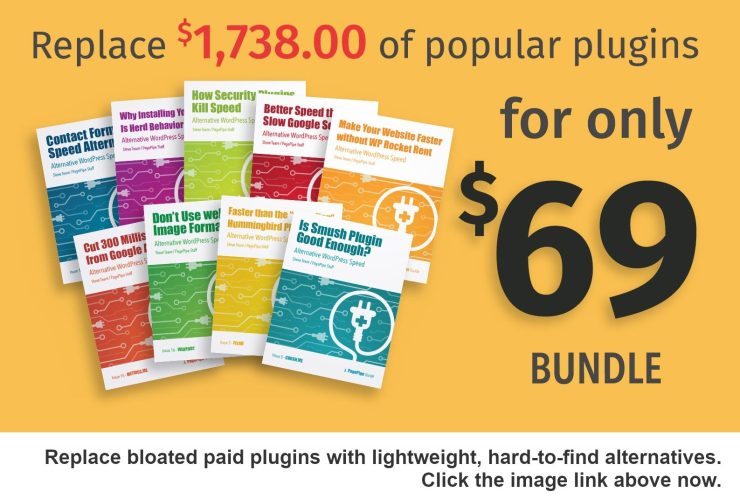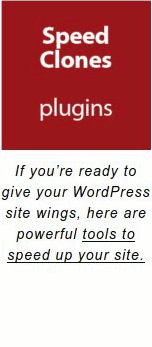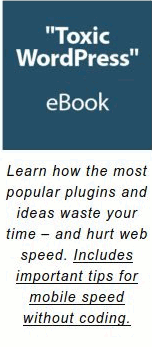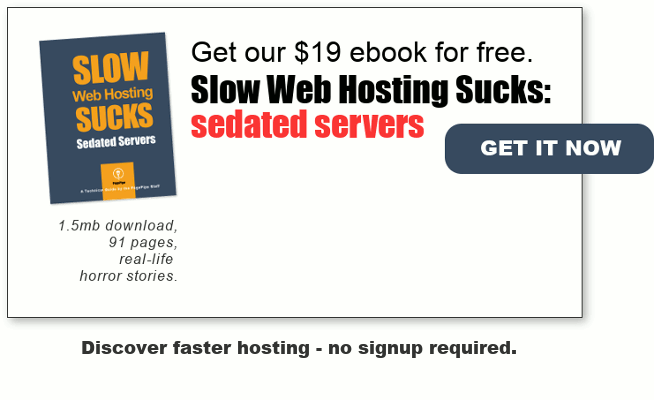Certain falsehoods about web speed are repeated over and over on blogs that should know better. They drive us crazy. Can we get rid of these mythical speed ideas? We doubt it. But we’ll feel better if we inform you of propaganda that’s unwittingly passed along.
Here’s our list of chronic speed misinformation:
1Speed affects your search engine optimization (SEO).
Barely.
While Google pays lip service to speed, it clearly isn’t a major concern. They send out mixed messages about speed’s importance. The most notorious third-party widgets slowing down websites – other than Facebook social links – are Google’s Cloud-based API services, Google Fonts, Google Maps, Google Analytics, Google Adwords, etc. Most modern WordPress themes incorporate these things. Research studies show that speed affects Google page rank by less than 1 percent. Insignificant. What improves SEO most? Plain and simple: relevant content. Relevant to who? To people trying to solve problems!
Reference: http://www.codeinwp.com/blog/site-speed-vs-seo/
2Fast websites enjoy high conversion rates and a healthier bottom line.
Really? Then, where’s the long line for speed optimization services? Where’s the market pain?
There is evidence speed makes a significant difference in profitability for very-large, big-name sites – like Amazon, Ebay, Mozilla, and Apple. For most low-traffic sites, there is no measurable monetary gain. What does change is visitor perception of how credible website content might be. This is first impression or UX. Speed is a subconscious indicator of someone valuing content enough to deliver it quickly and efficiently. It’s the opposite of apathy and bloat. It’s web hospitality, etiquette, and caring.
3Running a successful website starts with choosing a good host. Hosting makes a difference in SEO.
Baloney! Wrong again.
Hosting may add conveniences and security for site management. But speed is dependent upon optimizing and limiting the number of website components. Hosting can make a difference in Time-to-First-Byte (TTFB). This is the parameter Google uses in it’s search algorithm. But we repeat, TTFB only influences SEO by less than 1 percent. Is special, costlier hosting really benefiting SEO? No. Remember, content relevance is more important – always! The average web page now weighs 2.3 to 3.0 megabytes. It doesn’t matter how long it actually loads for SEO. It does make a difference in how frustrated a site user feels. The upper tolerance seems to be 2 seconds. Even though the average page load is now 8 seconds. Horrible! Those load times have nothing to do with hosting and everything to do with extravagant and out-of-control developers and designers.
4Caching WordPress is so effective that it can result in a 10x speed gain over a non-cached website.
Hogwash!
The reason web builders see improvement from caching plugins isn’t from caching features. It’s from the activation of Gzip compression, far-futures expiration, and minifying Javascript and CSS files. Those extra features have little to do with caching. In fact, most modern hosting has already activated Gzip server-side. On a well-optimized website, we’ve rarely see benefits from caching plugins – such as the oft-recommended, free W3 Total Cache plugin. Or even WP Super Cache. Both very popular plugins with millions of installs. They are the emperor’s new clothes. Only a small percentage of your site traffic benefits from caching. This is usually around 20 percent returning visitors.
5Too many plugins slow down your WordPress website.
Bogus information!
How many plugins are too many? We’ve installed over 70 active plugins on websites that load in under 2 seconds on shared hosting. Not all plugins are created equal. Sure some will slow down your website – especially if they call offsite using third-party Javascript. Facebook real-time social links are the worst offender for slowing down a website. Why include this unprofitable baggage instead of using a static image link or CSS text link? Craziness.
6The best tool to measure web speed is Google PageSpeed Insights.
No! NO!
For WordPress, if you use this Google tool, you’ll be very frustrated. The “defer Javascript error” message will light up as a fail every time. WordPress relies heavily on Javascript – especially the jQuery library. Google doesn’t even use these test-scoring criteria in their own page ranking algorithm. If they don’t care, why should you? A better test is WebPagetest.org (also owned on-the-down-low by Google). This comprehensive test is open-source, free and tells a more in-depth story. Our second favorite speed test tool is Pingdom.com.
Reference: https://pagepipe.com/render-blocking-js-is-the-most-annoying-and-unresolvable-error-message/
7Google says I need to have a performance goal of 400 millisecond page load times.
Google is full of idealistic waste matter.
The average load time today is 8 seconds. That is bad but there are many slower sites. Most website-optimization professionals agree a 2-second load for WordPress is doable with good optimization discipline. That is our goal. The saving grace is user-perceived load time – not actual load time.
8Content Delivery Networks (CDN) always speed up load times.
Really?
Maybe for international locations, but we’ve never seen improvements inside the USA. We have seen CDNs (like CloudFlare) actually slow down load times and cause missing content errors. Again, a well-optimized site rarely benefits from CDN. Caching and CDN are band-aids for sloppy web design.
Godspeed-
![]()
Steve Teare
performance engineer
June 2025
PagePipe Site Tuning Services for Speed
Instead of band-aid approaches, we drill down to the root cause of your slow site. This is origin optimization. Also known as site tuning. To do this, we analyze site components:
- Hosting
- Theme
- Plugins
- Scripts and third-party services.
- Images and media library.
- We minimize globally loading plugin effects.
Find out more details about Site Tuning – Get Speed!






